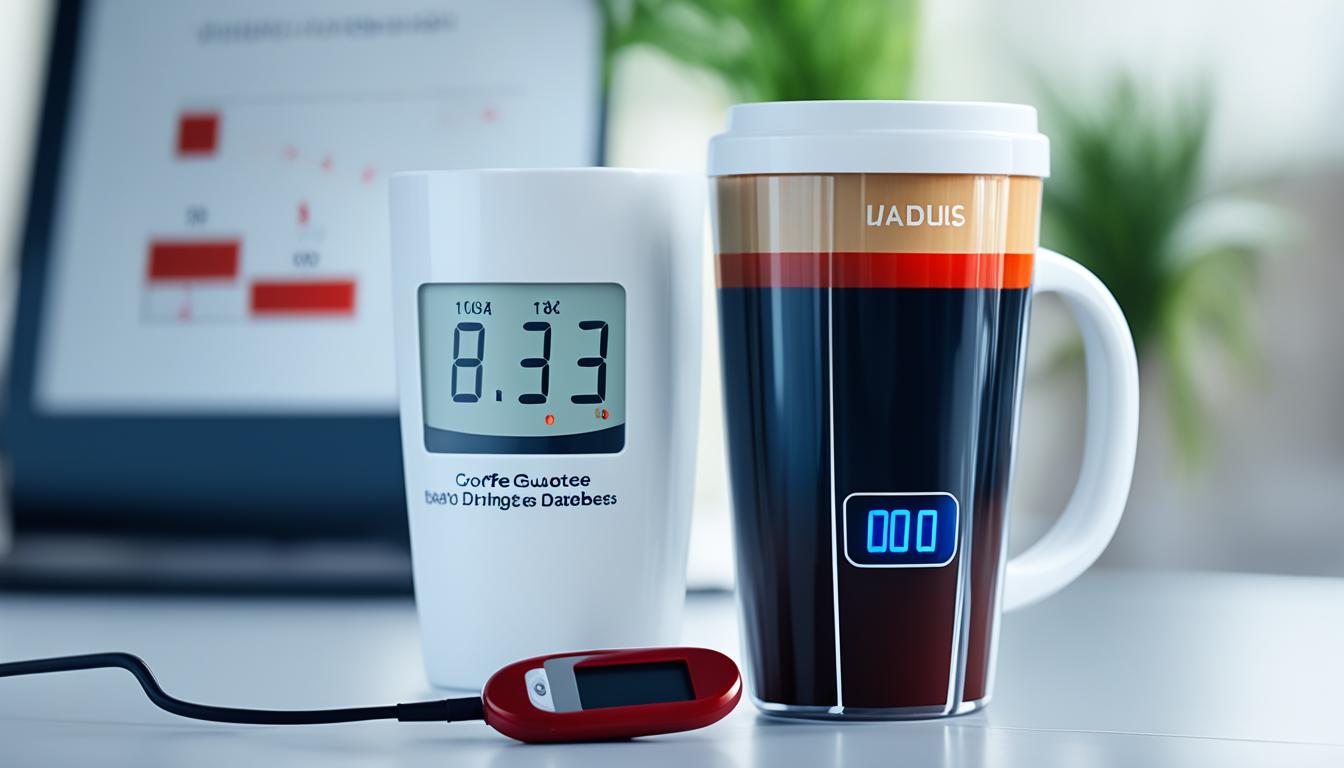Coffee and its effects on diabetes have been the subject of extensive research. For individuals with diabetes or those at risk of developing the condition, understanding the relationship between coffee and diabetes is crucial. In this article, we will explore the potential benefits and risks associated with coffee consumption, its impact on blood sugar control, and the role it plays in diabetes management.
Coffee has garnered attention for its potential health benefits and its role in diabetes prevention and management. However, the impact of coffee on blood sugar levels and overall diabetes management can vary from person to person. By examining the available evidence, we aim to provide a comprehensive understanding of the complexities surrounding coffee and its association with diabetes.
Key Takeaways:
- Coffee consumption has been linked to a reduced risk of developing type 2 diabetes in multiple studies.
- Regular coffee intake may improve blood sugar control and insulin resistance in individuals with diabetes.
- Caffeine, the primary active ingredient in coffee, can impact blood sugar levels and insulin sensitivity.
- Individual factors, such as age, weight, and overall diet, can influence how coffee affects blood sugar control.
- Understanding the mechanisms behind coffee’s impact on blood sugar control requires further research.
The Potential Benefits of Coffee for Diabetes Management
While it’s often advised to approach coffee consumption with caution for individuals with diabetes, some studies suggest that drinking coffee, whether caffeinated or decaffeinated, may actually have potential benefits for diabetes management.
Coffee consumption has been associated with a decreased risk of developing type 2 diabetes, according to several systematic reviews and meta-analyses. This suggests that incorporating coffee into a diabetes diet could be a beneficial dietary choice.
Furthermore, research indicates that coffee consumption may contribute to improved blood sugar control and reduced insulin resistance in individuals with diabetes. These effects may be attributed to bioactive compounds present in coffee, such as antioxidants, which have anti-inflammatory and metabolic properties.
The Health Effects of Coffee and Diabetes
“Drinking coffee has shown promise in reducing the risk of type 2 diabetes and improving blood sugar control in individuals with diabetes. The presence of bioactive compounds in coffee may play a significant role in these health benefits.”
Understanding the potential benefits of coffee for diabetes management can help individuals make informed decisions about their dietary choices and optimize their blood sugar control.
The Role of Coffee in Type 2 Diabetes Prevention
Studies have shown that regular coffee consumption is associated with a reduced risk of developing type 2 diabetes. In fact, a meta-analysis of prospective studies found that each additional cup of coffee consumed daily was associated with a 7% reduction in the risk of developing type 2 diabetes.
This protective effect may be attributed to various factors, including the presence of antioxidants, such as chlorogenic acid, in coffee. These compounds have been shown to improve glucose metabolism and insulin sensitivity, thereby reducing the risk of developing diabetes.
Coffee’s Impact on Blood Sugar Control
One of the key aspects of diabetes management is maintaining optimal blood sugar control. Research suggests that coffee consumption may play a role in regulating blood sugar levels, making it a potential ally for individuals with diabetes.
Table: Potential Effects of Coffee on Blood Sugar Control
| Effect | Findings |
|---|---|
| Improved insulin sensitivity | Studies have shown that regular coffee consumption may help improve insulin sensitivity in individuals with diabetes. |
| Reduced risk of hyperglycemia | Some research suggests that coffee consumption may be associated with a lower risk of hyperglycemia, a condition characterized by high blood sugar levels. |
| Possible positive impact on glycemic control | Emerging evidence suggests that coffee consumption may help regulate glycemic control, potentially leading to better blood sugar management. |
To fully harness the potential benefits of coffee for blood sugar control, it’s important to consume coffee in moderation and consider individual factors, such as caffeine tolerance and overall dietary pattern.
Additionally, it’s crucial to monitor blood sugar levels regularly and consult with a healthcare professional to determine the appropriate coffee consumption strategy as part of a comprehensive diabetes management plan. What works for one individual may not necessarily work for another, highlighting the need for personalized approaches.
Coffee consumption has the potential to offer some benefits for diabetes management, including a reduced risk of developing type 2 diabetes and improved blood sugar control. However, it’s essential for individuals with diabetes to monitor their blood sugar levels closely and consult with healthcare professionals to determine an appropriate coffee consumption strategy. By leveraging the potential health effects of coffee, individuals with diabetes can enhance their overall diabetes management and optimize their blood sugar control.
The Impact of Caffeine on Blood Sugar Control
Caffeine, the primary active ingredient in coffee, can have an impact on blood sugar control in individuals with diabetes. While coffee consumption is a popular daily habit for many, it’s important to understand how caffeine can affect blood sugar levels, especially for those managing type 2 diabetes.
Research has shown that caffeine intake can raise blood sugar levels and insulin levels in individuals with type 2 diabetes. This is because caffeine has the ability to lower insulin sensitivity, which results in reduced sugar absorption by cells and increased insulin production.
However, it’s crucial to note that the impact of caffeine on blood sugar can vary from person to person. Some individuals with diabetes may not experience significant changes in their blood sugar levels with moderate caffeine consumption. It’s always recommended to monitor blood sugar regularly and consult with a healthcare professional for personalized guidance.
“Caffeine intake can affect blood sugar levels and insulin levels in individuals with type 2 diabetes.”
Understanding the relationship between caffeine and blood sugar control is essential for diabetes management. By staying informed about the potential effects of caffeine and monitoring blood sugar levels, individuals with diabetes can make informed decisions about their coffee consumption and adjust as needed to maintain optimal blood sugar control.
Managing Caffeine Consumption For Blood Sugar Control
For individuals with diabetes, managing caffeine consumption can be an important aspect of blood sugar control. Here are some tips to keep in mind:
- Monitor blood sugar levels: Regularly checking blood sugar levels can help identify any effects that caffeine may have on blood sugar control.
- Consult with a healthcare professional: A healthcare professional can provide personalized advice on managing caffeine intake and its impact on blood sugar.
- Consider decaffeinated options: For those sensitive to caffeine or concerned about its impact on blood sugar, switching to decaffeinated coffee can be a suitable alternative.
- Adjust caffeine intake: Individual tolerance to caffeine can vary, so adjusting the amount of caffeine consumed and observing its effects on blood sugar can be beneficial.
Taking an individualized approach to coffee consumption and caffeine intake can help individuals with diabetes achieve better blood sugar control and effectively manage their condition.
| Pros | Cons |
|---|---|
|
|

Individual Factors and Coffee’s Effect on Blood Sugar
Several individual factors can influence how coffee affects blood sugar control in individuals with diabetes. These factors include age, weight, overall diet, and caffeine tolerance.
When it comes to coffee consumption and diabetes prevention, studies have shown that people with diabetes who regularly consume coffee may have lower blood sugar levels compared to those who do not.
However, it is important for individuals with diabetes to monitor their blood sugar levels closely and consult with a healthcare professional to determine the impact of coffee on their blood sugar control. Everyone’s body is different, and what works for one person may not work for another.
For some individuals with diabetes, coffee may fit well within their diabetes diet and help them maintain blood sugar control. However, others may find that coffee affects their blood sugar levels negatively and may need to limit their intake or switch to decaffeinated options. The key is to find the right balance that works for your individual needs and health goals.
Remember, managing blood sugar levels is crucial for diabetes management, and coffee is just one aspect to consider among many lifestyle choices. It is always recommended to consult with your healthcare provider or a registered dietitian to develop a personalized diabetes management plan that suits your specific needs.
| Factors | Effect on Blood Sugar Control |
|---|---|
| Age | May influence how coffee affects blood sugar levels |
| Weight | May impact the response to coffee and blood sugar control |
| Overall Diet | Can interact with coffee consumption and blood sugar levels |
| Caffeine Tolerance | May determine the individual’s sensitivity to coffee’s effects on blood sugar |
Understanding the Mechanisms of Coffee’s Impact on Blood Sugar
The exact mechanisms underlying coffee’s impact on blood sugar control and insulin sensitivity are not fully understood. However, studies suggest that caffeine raises levels of stress hormones, such as epinephrine, which can reduce sugar processing by cells and insulin production. Caffeine also blocks a chemical called adenosine, which plays a role in insulin regulation. Lack of sleep due to caffeine consumption may additionally contribute to reduced insulin sensitivity. Further research is needed to fully understand these mechanisms and their implications for diabetes management.
| Mechanisms | Impact |
|---|---|
| Raise stress hormones (epinephrine) | Reduces sugar processing by cells and insulin production |
| Block adenosine | Affects insulin regulation |
| Lack of sleep due to caffeine consumption | May contribute to reduced insulin sensitivity |
Insulin Sensitivity and Coffee Consumption
The relationship between coffee consumption and insulin sensitivity appears to be complex. While caffeine has been shown to decrease insulin sensitivity in some individuals, the overall impact may vary depending on individual factors, such as age, weight, and overall health status. It is important to note that moderate caffeine consumption, as commonly found in coffee, may not significantly impact insulin sensitivity for everyone.
Further research is needed to fully understand the specific mechanisms through which coffee affects blood sugar control and insulin sensitivity in individuals with diabetes. By gaining a deeper understanding of these mechanisms, we can develop targeted strategies to optimize diabetes management and improve overall health outcomes.
Individualized Approaches to Coffee Consumption for Diabetes Management
When it comes to managing diabetes, coffee consumption can play a role in blood sugar control. However, the impact of coffee can vary from person to person. That’s why it’s important for individuals with diabetes to adopt individualized approaches to coffee consumption as part of their diabetes management plan.
Monitoring blood sugar levels after consuming coffee can provide valuable insights into how it affects each individual. This allows for adjustments in caffeine intake accordingly. Some individuals may find that their blood sugar levels are more stable when they consume decaffeinated coffee or limit their overall caffeine intake. Consulting with a healthcare professional or registered dietitian can help determine the most suitable approach to coffee consumption based on individual needs and goals.
“Monitoring blood sugar levels after consuming coffee can provide valuable insights into how it affects each individual.”
By taking an individualized approach to coffee consumption, individuals with diabetes can better manage their blood sugar levels and optimize their diabetes management efforts. It’s essential to prioritize a well-rounded diabetes diet that includes a variety of nutrient-dense foods, in addition to considering the impact of coffee.
Benefits of an Individualized Approach
Adopting an individualized approach to coffee consumption for diabetes management offers several benefits:
- Improved blood sugar control: By monitoring the impact of coffee on blood sugar levels, individuals can make informed decisions about their caffeine intake.
- Personalized strategies: Everyone’s response to coffee can be different, so finding the right approach based on individual needs can lead to better outcomes.
- Enhanced diabetes management: Taking a holistic approach to diabetes management can help individuals achieve optimal blood sugar control while maintaining a balanced and enjoyable lifestyle.
Remember, diabetes management is multifaceted, and coffee consumption is just one piece of the puzzle. Prioritizing regular physical activity, maintaining a healthy body weight, and following a balanced diabetes diet are equally important for managing blood sugar levels and overall health.
Coffee Consumption Tips for Diabetes Management
Here are some practical tips to consider when incorporating coffee into your diabetes management plan:
- Monitor your blood sugar levels: Regularly checking your blood sugar levels after consuming coffee can provide valuable insights into how it affects your body.
- Experiment with caffeine intake: Pay attention to how different amounts of caffeine impact your blood sugar levels. You may find that adjusting your caffeine intake can help stabilize your blood sugar.
- Consider decaffeinated options: If you find that caffeine negatively affects your blood sugar control, switching to decaffeinated coffee or reducing your overall caffeine intake may be beneficial.
- Consult with a healthcare professional: A healthcare professional or registered dietitian can offer personalized guidance and advice based on your specific needs and goals.
Adopting an individualized approach to coffee consumption is key to effectively managing diabetes and maintaining optimal blood sugar control. With careful monitoring, adjustments, and professional guidance, individuals with diabetes can enjoy their cup of coffee while staying in control of their health.

Conclusion
In conclusion, coffee consumption can have both positive and negative effects on blood sugar control in individuals with diabetes. While some studies suggest that coffee may reduce the risk of developing type 2 diabetes and improve blood sugar control, the impact of coffee on blood sugar can vary depending on individual factors and caffeine tolerance. It is crucial for individuals with diabetes to monitor their blood sugar levels regularly, consult with healthcare professionals, and develop personalized strategies for coffee consumption as part of their overall diabetes management plan.
By understanding the relationship between coffee and diabetes, individuals with diabetes can make informed decisions about their caffeine intake and optimize blood sugar control. It is important to remember that everyone’s response to coffee may be different, and what works for one person may not work for another. Therefore, it is essential to find a balance that works best for you and your diabetes management.
Incorporating coffee into a diabetes diet requires careful consideration and moderation. Some individuals may choose to switch to decaffeinated coffee or limit overall caffeine intake to better manage their blood sugar levels. Consulting with a healthcare professional or a registered dietitian can provide valuable guidance in creating an individualized approach to coffee consumption.
In conclusion, while enjoying a cup of coffee can be a part of a healthy lifestyle, individuals with diabetes should approach coffee consumption with caution and awareness. By understanding the potential benefits and risks associated with coffee and taking steps to manage blood sugar levels, individuals with diabetes can maintain better control of their condition and lead a healthier life.
FAQ
Can drinking coffee reduce the risk of developing type 2 diabetes?
Some studies suggest that drinking coffee, whether caffeinated or decaffeinated, may actually reduce the risk of developing type 2 diabetes.
How does coffee consumption affect blood sugar control in individuals with diabetes?
Coffee consumption has been linked to improved blood sugar control and reduced insulin resistance in individuals with diabetes. However, caffeine intake can raise blood sugar levels and insulin levels in some individuals with type 2 diabetes.
Does the impact of coffee on blood sugar control vary from person to person?
Yes, the impact of caffeine on blood sugar control can vary from person to person. Factors such as age, weight, overall diet, and caffeine tolerance can influence how coffee affects blood sugar control in individuals with diabetes.
What are the possible mechanisms underlying coffee’s impact on blood sugar control?
The exact mechanisms are not fully understood, but studies suggest that caffeine raises stress hormones, reduces sugar processing by cells, and blocks a chemical called adenosine, which plays a role in insulin regulation.
Should individuals with diabetes adjust their coffee consumption?
Due to the potential impact on blood sugar control, individuals with diabetes should consider individualized approaches to coffee consumption. This may include monitoring blood sugar levels, adjusting caffeine intake, switching to decaffeinated coffee, or limiting overall caffeine intake.
What should individuals with diabetes do to optimize blood sugar control?
It is important for individuals with diabetes to monitor their blood sugar levels, consult with healthcare professionals, and develop personalized strategies for coffee consumption as part of their overall diabetes management plan.




